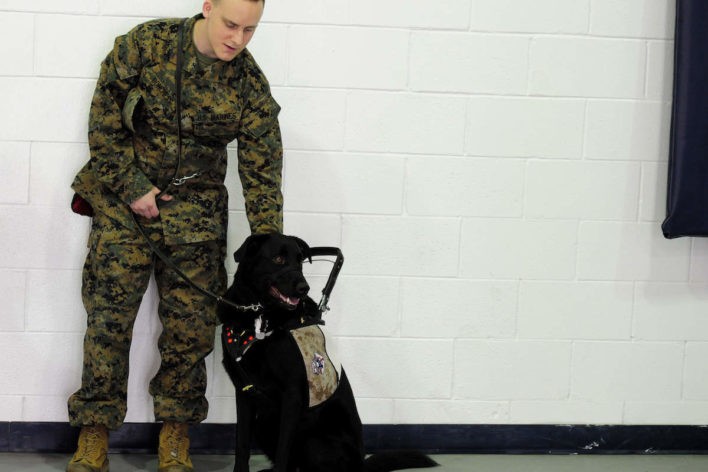PAWS Veterans Therapy Act: Helping Veterans with PTSD

What is the PAWS Veterans Therapy Act?
PAWS, or the Puppies Assisting Wounded Servicemembers for Veterans Therapy Act, is a program created to provide service dogs to eligible veterans diagnosed with PTSD. The bill, as passed, required the Department of Veteran Affairs to implement a 5-year pilot program to provide canine training to eligible veterans. In 2022, the VA announced the start of a PAWS pilot program in the following areas at VA medical centers:
- Anchorage, Alaska.
- Asheville, N.C.
- Palo Alto, Calif.
- San Antonio, Texas.
- West Palm Beach, Fla.
Veterans must be enrolled in the VA health care system and be recommended for participation by a qualified medical health provider or clinical team in order to qualify.
History of the PAWS Act
Previously the VA only covered service dog costs for veterans with visual, hearing, or mobility impairments. Legislators have tried to change this since 2009
In January 2009, Senator Al Franken introduced a bill requiring the VA to conduct a 3-year pilot study on the benefits and feasibility of service dogs for PTSD and other disabilities. In 2010 the bill funding the study was passed and incorporated into the defense budget.
The VA began the study, but partnered with contractors who allegedly did not perform proper screening of their dogs. About 25% of the dogs were found to have hip dysplasia, two dogs reportedly bit children, and two others were listed as having medical problems. Contractors also reportedly discouraged those participating in the program from reporting problems with their dogs, causing the study to be even more inaccurate.
In 2012, the VA suspended the study while they restructured and hired new contractors and trainers.
Time Factors
Some legislators had expressed frustration at the length of time it took for the VA to incorporate service dogs as a part of mental health treatment for veterans. Representative Jim McGovern, D-MA., reported that he has been trying to work with the VA on this for years, but has been repeatedly told that they are “looking into it.” McGovern even admitted, “I haven’t checked in this year (this was in 2019) with VA folks, because I’ve just kind of given up on them.”
The VA had apparently showed some earlier resistance to providing service dogs for veterans with mental health issues. Dr. Michael Fallon, the VA’s chief veterinarian, gave an interview with National Public Radio in 2017 where he is quoted saying, “I would say there are a lot of heartwarming stories that service dogs help, but scientific basis for that claim is lacking.”
The New York Times reports some VA officials saying “the bill could ‘result in unintended and negative consequences’ for veterans entrusting their well-being to ‘this unsubstantiated treatment regime’.”
Other Studies Showed Otherwise
While the VA attempted to complete its study that began in 2012, other studies since had shown that veterans do benefit from service dogs.
In 2014, Kaiser Permanente conducted a study with 75 veterans, with results showing a reduction in PTSD/depression symptoms and in substance abuse, and an improvement in interpersonal relationships.
In 2018, Purdue University conducted its own study with 73 veterans and found that those using service dogs produced a higher level of cortisol production, a hormone involved in processing stress. Participants also had an average of a 12-point reduction on the VA’s PTSD symptom checklist.
Service Dogs From Non-Profits Can Be Costly
While veterans can obtain a service dog from non-profit organizations, the cost could range from $15,000-$30,000, and waiting lists could be a year or longer. There are also costs associated with owning a service dog, such as veterinary fees and food. These costs make it difficult or deter many veterans from getting a service dog. With almost 20% of post-9/11 veterans suffering from PTSD and about 20 veterans a day committing suicide, legislators and other supporters of the PAWS Act, such as the Veterans of Foreign Wars and the American Legion, continue to push for the passage of the bill.
Although time and labor-intensive, anyone with a disability according to the ADA, physical or mental, can train their own service dog. A good overview and guide for owner-training a service dog can be found here.
Results of the Study
According to Military.com, veterans were paired with both service dogs and emotional support dogs for an 18-month period. The results found that there was a 3.7 point drop in the PTSD symptoms scores with those who had a service dog. They also found that there were declines in suicidality and anger with the service dogs.
This study shows that there are some big benefits to pairing veterans who have been diagnosed with PTSD with service dogs.
According to the 2020 National Veteran Suicide Prevention Annual Report, the average number of veteran suicides per day was 17.6 in 2018. The PAWS Act could help with the rate of veteran suicides, as well as other symptoms of PTSD.
Representative Sherrill Praises Passage of PAWS
Representative Mikie Sherrill (NJ-11) released this statement on the passage of the bipartisan PAWS for Veterans Therapy Act in the Senate:
“I am thrilled to see the Senate pass the bipartisan PAWS for Veterans Therapy Act. I’ve championed this legislation since my first term, because of the incredible impact it will have on veterans’ mental health. Experts agree that service dogs are one of the best mental health treatments to help bring relief, solace, and recovery for our veterans suffering from post-traumatic stress.
“I first became an advocate for this legislation after a number of conversations about the cost barriers many veterans face in trying to obtain a service dog. This treatment has proven results and when President Biden signs this bill into law, more of our veterans will gain access to this life-saving form of therapy. After dedicating so much to the nation, our veterans deserve the best care available and this program will help deliver it. It’s my hope the President signs it as soon as possible.”
The VA plans to work with accredited service dog training organizations that provide service dogs to veterans with PTSD, and who are accredited by an accrediting organization with demonstrated experience, national scope, and recognized leadership and expertise in the training of service dogs and education in the use of service dogs.
RELATED:
- Where To Find Service Dogs For Veterans
- Dog & Pet Military Discounts and Services
- Man’s Best Friend Versus PTSD
- PCS: Moving the Family Pet
- Federal Commission Recommends Marijuana Research for Veterans
- K9 Veterans Day: Military Working Dog History
>>For great military and veteran discounts direct to your inbox, sign up for the Military and Veteran Discounts Newsletter! It’s free from MyMilitaryBenefits. Start saving today!
About the author
Julie Provost is a freelance writer, and blogger. She lives in Tennessee with her National Guard husband and three boys.


